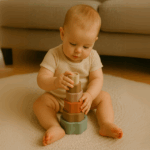A child's development in the first year is a special and fast-paced period full of milestones and changes.
At this age, children learn new skills every day, from mastering motor functions to starting to communicate.
Toys play a crucial role in this development. In this article, we discuss how a 1-year-old's development progresses and what influence toys can have on it.
Motor Development
Gross motor skills
In their first year, children begin to develop their gross motor skills.
This includes activities such as crawling, standing and eventually walking. Toys that encourage these skills could include a walker, balls and large building blocks.
These types of toys help strengthen muscles and improve coordination.
Fine Motor Skills
Fine motor skills, which include smaller movements such as grasping objects and manipulating small objects, also begin to develop around this age.
Toys such as stacking rings, puzzles and shapes helps improve these skills. Such activities promote hand-eye coordination and precision in hand movements.
Cognitive Development
Problem-solving ability
Cognitively, children at this age begin to understand the world around them and solve simple problems.
Toys that contribute to this include simple puzzles, shape sets and interactive toys that teach cause-and-effect relationships.
By playing with these, children learn to think and come up with solutions, boosting their cognitive skills.
Language development
Around their first birthday, many children begin to say their first words and understand simple instructions.
Booklets with pictures, toys with sounds and talking dolls are excellent tools to promote language development.
These types of toys encourage children to learn words and improve their communication skills.
Social and Emotional Development
Self-reliance
At the age of 1, children also start developing self-reliance.
Here, it is important that they have toys that encourage them to play independently.
This can range from building blocks to dolls and hugs.
Playing independently helps children develop self-confidence and feel comfortable without constant adult supervision.
Social Interaction
Although most 1-year-olds do not yet fully participate in shared play, they do start to show interest in other children and adults.
Toys that encourage joint activities, such as large building blocks or music and dance toys, can help children develop social skills.
These types of interactive toys encourage shared experiences and lay the foundation for future social interactions.
Toy Recommendations by Category
Educational toys
Educational toys can make a huge contribution to a child's development.
These include shape sorters, stacking cups and interactive books.
These types of toys help teach basic concepts such as colours, shapes and numbers.
Musical toys
Musical toys, such as xylophones, drums and rattles, are not only fun but also educational.
It helps children recognise rhythm and melody while promoting their fine motor skills and coordination.
Construction toys
Construction toys such as large building blocks or Duplo sets are ideal for developing both gross and fine motor skills.
They also stimulate creativity and problem-solving skills.
Role-playing Toys
Role-play toys such as dolls, soft toys and toy kitchens help children develop their imagination and social skills.
They learn to assume different roles and thus better understand the world around them.
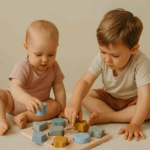 Puzzles
Puzzles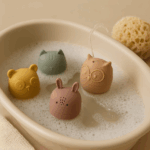 Water toys
Water toys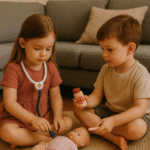 Role-playing toys
Role-playing toys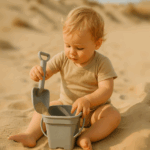 Sand toys
Sand toys